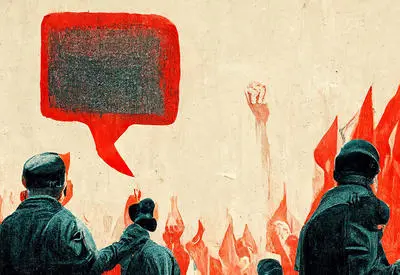Political arguments often seem to be about disagreements over what the facts are. But when it comes to politics and even the edges of science, value judgements creep into what is otherwise presented as factual claims. If we are to correctly diagnose the source of political conflict, we must learn to detect when the line between fact and value has been blurred, argues Fabienne Peter.
Many agree with the recent Just Stop Oil protesters in London that much more needs to be done to mitigate climate change, but of course not everyone does. So what do the two sides disagree about? Is it a disagreement about facts, centring on different interpretations of the evidence relating to climate trends and their effects on our environment? Or is it a disagreement about values, centring on different opinions on how to weigh the burdens of unmitigated climate change to different groups of people and other living beings, or on how to weigh the costs and benefits of climate change policies? Most likely, it’s both. But it’s not always possible to disentangle the fact and value dimensions of political disagreement.
Because facts and values tend to get entangled in our political views, many of our political disagreements are quite muddled. But if we are to correctly diagnose the source of political conflict, as well as when expert advice is guided by ideology, we must learn to detect when values creep into factual claims.
 SUGGESTED READING
The culture war is killing progress
By Frank Furedi
SUGGESTED READING
The culture war is killing progress
By Frank Furedi
There are several explanations for the entanglement of facts and values in our political views. A first set of explanations focuses on the value-ladenness of factual statements. Factual statements are rarely value-neutral. Even simple factual statements involve a whole range of social conventions and norms. Consider, for example, the fact that I had my lunch at midday. Understanding what this claim implies involves conventions regarding the interpretation and measuring of time, norms around what a lunch meal might include, etc. Those social conventions and norms smuggle in values, for example, the value of social coordination, or the value of productivity. The relevant value judgments are so embedded in our everyday life that they go unnoticed. They may be innocuous, or widely shared amongst most of the people we interact with, but they have the potential to become a ground of controversy.
___
Factual statements are rarely value-neutral. Even simple factual statements involve a whole range of social conventions and norms
___
The facts that define our political context, say facts about how infectious diseases spread, or about the causes of poverty, are much more complex. And they are potentially even more value-laden as a result. Such facts tend to be the product of scientific inquiry, for example research in epidemiology or economics. But all scientific inquiry is heavily dependent on conventions and norms governing the process of scientific research. Those social conventions and norms are again channels for values, and those values are baked into the existing body of scientific theories. Scientific facts, as a result, are value-laden. Economic theories, for example, rely heavily on assumptions about rational behaviour, and those assumptions rest on value judgments about the interpretation of rationality and its relation to other values.





















Join the conversation